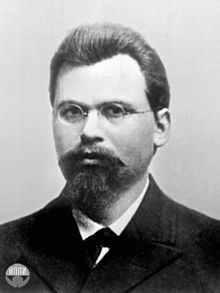Georgy Voronoy
Georgy Voronyi | |
|---|---|
 | |
| Born | Georgy Feodosevich Voronyi (Георгій Феодосійович Вороний) 28 April 1868 Zhuravka, Poltava Governorate, Russian Empire |
| Died | 20 November 1908 (aged 40) Warsaw, Congress Poland, Russian Empire |
| Other names | Georgiy Feodosiyovich Voronyi (Георгій Феодосійович Вороний; Russian Empire |
| Alma mater | Saint Petersburg University |
| Known for | Voronoi diagram (Voronyi Tessellation) Voronoi iteration Voronoi formula |
| Scientific career | |
| Fields | Continued fractions |
| Institutions | University of Warsaw |
| Doctoral advisor | Andrey Markov |
| Doctoral students | Wacław Sierpiński Boris Delaunay |
Georgy Feodosevich Voronyi (Russian: Георгий Феодосьевич Вороной; Ukrainian: Георгій Феодосійович Вороний; 28 April 1868 – 20 November 1908) was an Imperial Russian mathematician of Ukrainian descent noted for defining the Voronoi diagram.[1][2]
Biography
[edit]Voronyi was born in the village of Zhuravka, Pyriatyn, in the Poltava Governorate, which was a part of the Russian Empire at that time and is in Varva Raion, Chernihiv Oblast, Ukraine.
Beginning in 1889, Voronyi studied at Saint Petersburg University, where he was a student of Andrey Markov. In 1894 he defended his master's thesis On algebraic integers depending on the roots of an equation of third degree. In the same year, Voronyi became a professor at the University of Warsaw, where he worked on continued fractions. In 1897 he defended his doctoral thesis On a generalisation of a continuous fraction. He was an Invited Speaker of the ICM in 1904 at Heidelberg.[3]
When he was only 40 years of age, Voronyi began having stomach problems. He wrote in his diary:[4]
I am making great progress with the question under study [indefinite quadratic forms]; however, at the same time my health is becoming worse and worse. Yesterday I had for the first time a clear idea of the algorithm in the theory of forms I am investigating, but also suffered a strong attack of bilious colic which prevented me from working in the evening and from sleeping the whole night. I am so afraid that the results of my enduring efforts, obtained with such difficulty, will perish along with me.
Following a severe gall bladder attack, Voronyi died on November 20, 1908.

Works
[edit]Voronyi introduced the concept of what we today call Voronoi diagrams or tessellations. They are used in many areas of science, such as the analysis of spatially distributed data, having become an important topic in geophysics, meteorology, condensed matter physics, and Lie groups.
These tessellations are widely used in many areas of computer graphics, from architecture to film making and video games. Blender 3D includes a Voronoi texture generator as one of its main sources of randomly generated images, that can be applied as textures for many different uses.
Legacy
[edit]Among his students was Wacław Sierpiński (Ph.D. at Jagiellonian University in 1906). Although he was not formally the doctoral advisor of Boris Delaunay (Ph.D. at Kyiv University), his influence on the latter earns him the right to be considered so.[5]
In 2008 Ukraine released two-hryvnia coins commemorating the centenary of Voronyi's death.[6]
His son Yuriy Voronyi became a prominent transplant surgeon who performed the world's first human-to-human kidney transplant in 1933,[7] volunteered for the army of Central Council of Ukraine, and fought in the Battle of Kruty.[8] His daughter Mariia Vorona-Vasylenko became a teacher of Ukrainian language.[9]
See also
[edit]- Bowyer–Watson algorithm
- Centroidal Voronoi tessellation
- Delaunay triangulation
- Fortune's algorithm
- Laguerre–Voronoi diagram
- Voronoi deformation density
- Voronoi formula
- Voronoi iteration
- Voronoi pole
- Weighted Voronoi diagram
- Wigner–Seitz cell
References
[edit]- ^ Voronoï, Georges (1908a). "Nouvelles applications des paramètres continus à la théorie des formes quadratiques. Premier mémoire. Sur quelques propriétés des formes quadratiques positives parfaites" (PDF). Journal für die reine und angewandte Mathematik. 1908 (133): 97–178. doi:10.1515/crll.1908.133.97. S2CID 116775758.
- ^ Voronoï, Georges (1908b). "Nouvelles applications des paramètres continus à la théorie des formes quadratiques. Deuxième mémoire. Recherches sur les parallélloèdres primitifs" (PDF). Journal für die reine und angewandte Mathematik. 1908 (134): 198–287. doi:10.1515/crll.1908.134.198. S2CID 118441072.
- ^ "Sur une propriété du discriminant des fonctions entières par G. Voronyi". Verhandlungen des dritten Mathematiker-Kongresses in Heidelberg von 8. bis 13. August 1904. ICM proceedings. Leipzig: B. G. Teubner. 1905. pp. 186–189.
- ^ O'Connor, J. J. (11 June 2020). "Georgy Fedoseevich Voronyi". Mac Tutor - Math History. Retrieved 11 June 2020.
- ^ Liebling, Thomas; Pournin, Lionel (2012). "Voronoi diagrams and Delaunay triangulations: ubiquitous Siamese twins". Optimization Stories. Documenta Mathematica Series. Vol. ISMP. pp. 419–431. doi:10.4171/DMS/6/40. ISBN 978-3-936609-58-5.
- ^ Национальный банк Украины ввел в оборот монету “Георгий Вороной” Archived 2011-07-08 at the Wayback Machine
- ^ Matevossian, Edouard; Kern, Hans; Hüser, Norbert; Doll, Dietrich; Snopok, Yurii; Nährig, Jörg; Altomonte, Jennifer; Sinicina, Inga; Friess, Helmut; Thorban, Stefan (December 2009). "Surgeon Yurii Voronyi (1895-1961) - a pioneer in the history of clinical transplantation: in memoriam at the 75th anniversary of the first human kidney transplantation". Transplant International. 22 (12). Department of Surgery, Klinikum Rechts der Isar, Technische Universität of Munich, Munich, Germany.: 1132–1139. doi:10.1111/j.1432-2277.2009.00986.x. PMID 19874569. S2CID 12087935.
- ^ "Офіційний сайт Херсонської обласної клінічної лікарні - спеціалізована медична допомога". 2009-06-20. Archived from the original on 2009-06-20. Retrieved 2021-11-20.
- ^ Черкаська, Ганна (2017-08-09). "Діти Георгія Вороного". UAHistory (in Ukrainian). Retrieved 2021-11-20.
Further reading
[edit]- Syta, Halyna; van de Weygaert, Rien (2009). "Life and Times of Georgy Voronoi". arXiv:0912.3269 [math.HO].
External links
[edit]- 1868 births
- 1908 deaths
- People from Chernihiv Oblast
- People from Poltava Governorate
- People from Warsaw Governorate
- Mathematicians from the Russian Empire
- Academic staff of the University of Warsaw
- Saint Petersburg State University alumni
- Corresponding members of the Saint Petersburg Academy of Sciences
- Russian scientists
- Ukrainian mathematicians
